© ROOT-NATION.com - Use of content is permitted with a backlink.
The Assassin’s Creed franchise is so big and important that it’s hard to remember the times before it. It was one of the first true blockbusters of gaming, and its annual new games always attracted huge interest from the public. But success can’t last forever. After years of easy sales Ubisoft finally hit the rocks with Assassin’s Creed Syndicate. By no means a bad game, it suffered from bad press of the previous title, famous for its glitches. It was obviously a time to rethink the general strategy and try something new. That they did, announcing a one-year break, during which we got our first Assassin’s Creed movie. It was probably the last as well.
And now, in 2017, the wait is over. The company knew the importance of the release. One wrong move, and the franchise will be on the brink of disaster. Gamers don’t forgive easily, especially when we talk about an organization as massive as Ubisoft. Thankfully, they didn’t mess up.
Assassin’s Creed: Origins is a game that’s really easy to read. I can actually see the thinking process behind it. And almost every move by the developers makes sense. They removed the areas which we disliked and added something that the gaming community obviously enjoys. They remedied past mistakes and infused ideas from other games.
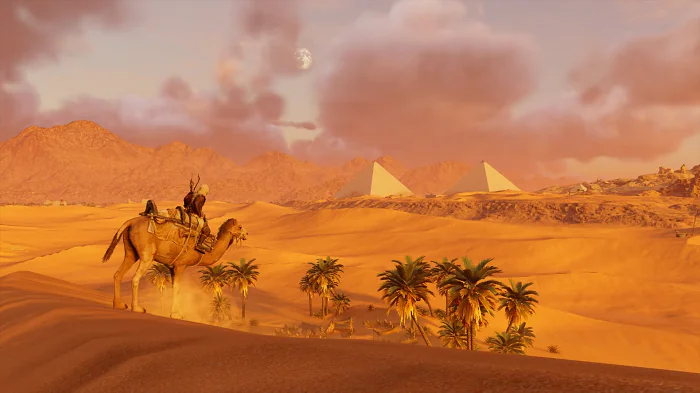
Assassin’s Creed: Origins is big, It’s enormous, in fact. That’s what you get when you don’t rush game into production. The creative freedom is seen here. The world is not only big, it’s also interesting. Every gamer knows that the story and the main character can suck, but if the world is ok than the game can at least be considered acceptable. In Assassin’s Creed: Origins, the world is the most interesting yet. Say what you will about this series, but the idea to put players into different time periods is brilliant. Especially when these periods are realistically recreated, using the help of historians and, in our case, Egyptologists.
The world of this game is as realistic as possible in the realm of multimedia. Dozens of movies got ancient Egypt totally wrong, telling stories about mummies and slaves. But Assassin’s Creed: Origins tries to be both fascinating and true to life, only sometimes sacrificing certain facts for sake of our entertainment. And that’s fine by me.
The main strength of this game is in the way it takes risks. No longer Assassin’s Creed depends on only fans. There are a lot of new ideas – not very original, but new nonetheless. While it’s easy to recognize an Assassin’s Creed game, a lot gave been changed. A couple years ago the company actually said that it considers Egypt one of the dullest areas for a potential game. It was funny reading it then, and it’s even funnier now.
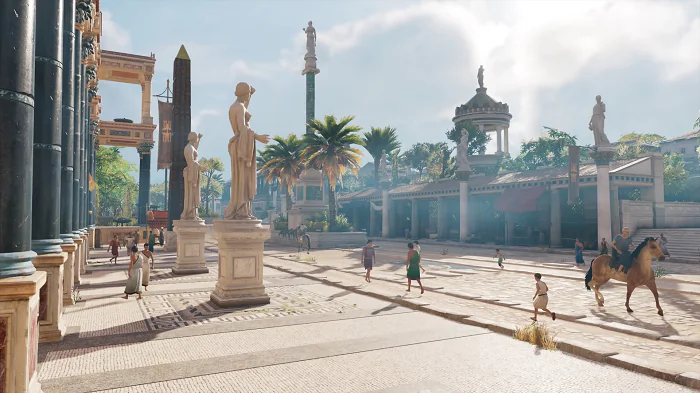
If you never player an Assassin’s Creed game or simply dislike the series, I advise to start from Assassin’s Creed: Origins.
Meet the Hero
Everything starts with the protagonist, Bayek. Surprisingly, it is a very good character, full of wit and drama. I didn’t expect to like him so much, but now I can honestly say that he is probably the best main guy the series had to offer – or at least one of the best.
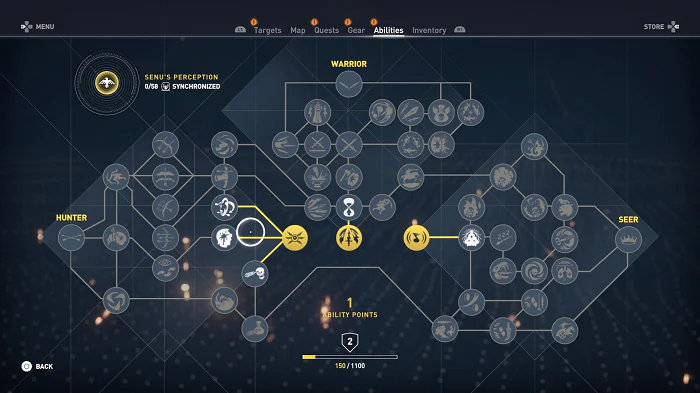
Bayek is not alone in his quest. Along the way he is joined by Aya – his loving wife and a deathly warrior. She, too, has a strong personality and is very likable. Overall, all characters are great and, thanks to that, the game feels important, with soul. It’s characters, not XP, that make us do all these quests.
The plot overall is solid as well. It does its job of motivating the players to do more and learn more. It’s nothing spectacular, but this series has seen much worse.
No one will call Assassin’s Creed: Origins spectacular – mostly because it was released on 2017. It is a year of fantastic open world games like The Legend of Zelda: Breath of the Wild and Horizon Zero Dawn. And they are better. Still, they shouldn’t be comparted to Origins too much.
In fact, many other games must be thanked for all excellence we have here. I already said that there aren’t many original ideas in Assassin’s Creed: Origins. All that’s new is mostly repurposed from other games. The Witcher 3 was an obvious influence. Creatively, the latest games of the series weren’t very exciting, and Ubisoft decided to borrow successful elements from another titles. And the influence is so palpable sometimes, I felt like I was controlling Geralt.
In Assassin’s Creed: Origins, we take part in a theatrical performance (just like in that one quest we all remember) and play detective, looking for clues. Bayek mumbles something and helps every person he meats. He’s not as cynical as Geralt and doesn’t take money for good deeds, but apart from that even the structure of quests is reminiscent of CD Project RED.
It may sound like a bad thing, but it really isn’t. Games always follow a certain trend, and I’d better play a good if a bit unoriginal game than a total disaster. Thanks to other games there are no more fetch quests and every encounter feel like a small story. A lot of side characters are as memorable as the main ones.
Among other inspirations are Tomb Raider and Shadow of Mordor, but not once Assassin’s Creed: Origins felt like a plagiarism. It remains true to its, ehm, origins.
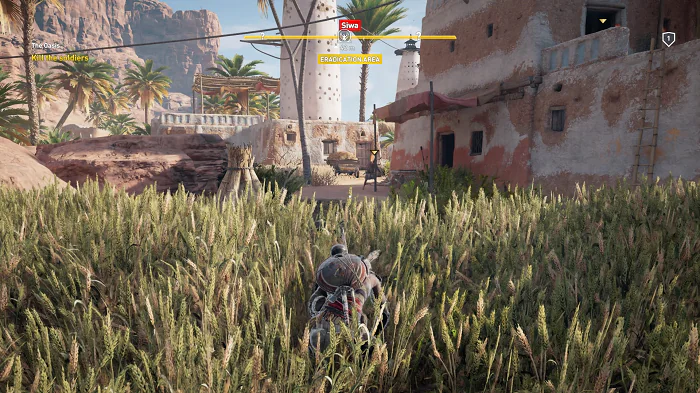
The battle mechanics, too, have been reworked. It looks less like a Arkham Asylum and more like Dark Souls. Bayek has strong and light attack, a special attack and a block. It’s important to stay out of foes’ reach and strike them from behind. The system is very deep and a lot changes depending on your weapon of choice. That’s why battles in Assassin’s Creed: Origins are never dull. Every new battle is an opportunity to experiment and try something new. Even the smallest of encounters make players think tactically. No mindless button mashing here.
Nothing’s perfect, of course. The AI is as dull as ever, not able to grasp at what’s happening. I have a feeling that in that regard the games haven’t changed one bit from the PS3 era.
The Wild Pharaoh Hunt
The enemy camps are aplenty in and they can be conquered in different ways. Sure of yourself? Fight openly. Or you can stay in the shadows, hiding bodies in bushes or throwing them from the walls. You can treat Assassin’s Creed: Origins as a stealth game, ignoring the guards completely. While the stealth system hasn’t been changed, I loved the freedom of choice here – even if I couldn’t become a full-fledged pacifist like in Deus Ex or Dishonored. The freedom to kill only the necessary targets is integrated into Bayek’s character. He’s really not the guy who likes killing for fun.
Another surprising element from the other game came from Desiny which gifted Assassin’s Creed: Origins the inventory system. All your belongings – weapon, armor etc – have different types of rarity. You can sell the bad ones and collect the rarest. Another “borrowed” idea, but it works here. The UI overall is much better than before.
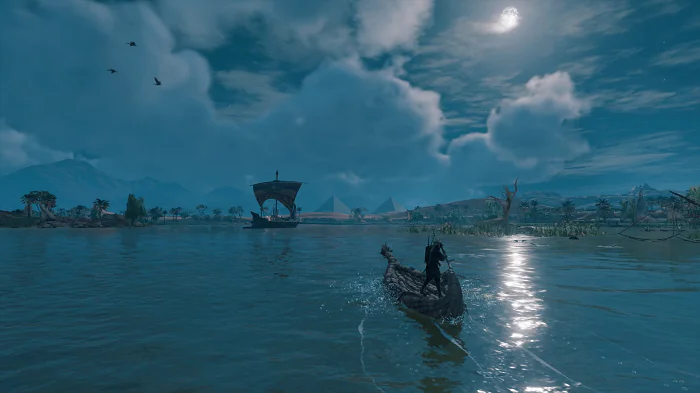
Weapons are what makes the game so versatile. A sword and a staff behave differently. Sometimes it’s best to change the weapon amid the fight, even if you prefer something else. Different enemies require different weapons. Projectiles are the same: at distance it’s better to use slow and powerful bow, in close fight the fastest bow is the best.
Just like in Far Cry – another Ubisoft property – here you can scout the bases by using a flying buddy. In this case it’s Senu – an eagle which can detect different characters or items and just mark all visible enemies. He’s invaluable for stealth missions, and his abilities can be further upgraded to make him an organic drone of death.
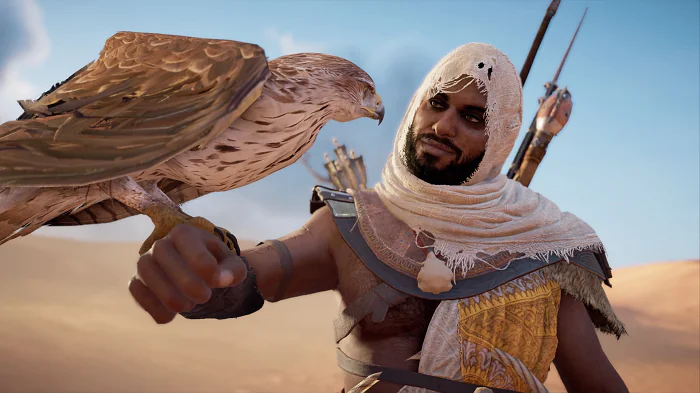
But not everything is fine here. Not at all. A lot of elements from older games are welcome, but not all of them. The return of modern time segments is one example. I literally don’t know anyone who enjoys those buzzkills, and in Assassin’s Creed: Origins they are as intrusive and unnecessary as ever. Games must take us into different worlds, but I just couldn’t because AC kept interrupting with its sci-fi mumbo-jumbo. Pacing, atmosphere, interest – all gone when these episodes occur.
Ancient Egypt is a great sandbox – no pun intended. Pyramids, deserts, sprawling cities and hundreds of secrets – you’ll definitely find what to do here. But Assassin’s Creed: Origins is not only massive, it’s also beautiful. The game works on the newest AnvilNext 2.0 which looks great on any hardware. Ubisoft especially wants us to care about 4K resolution on the newest consoles like PlayStation 4 and Xbox One X, but even standard hardware shows magnificent picture. It has nothing on Horizon Zero Dawn and won’t become the best-looking game of the year, but it still deserves the praise.
Unfortunately, AncilNext is not that great at facial animations. As it often happens, during side quests the characters look disinterested and downright dead. In that aspect the game is not nearly as good as the Witcher 3 or Horizon Zero Dawn. The story episodes look better.
Read also: Star Wars Battlefront II review – Force Choked to Death
After Unity debacle Ubisoft took extra measures to ensure the quality of all new games. Assassin’s Creed: Origins is surprisingly bug-free. Sure, there are lots of annoying glitches, as it happens with huge games, but other than that, it’s very polished. Multiple patches improved FPS on weaker machines and fixed bags.
2017 will be remembered for two things. First, amazing console exclusives. Second, microtransactions. Big companies are as aggressive as ever in pushing microtransactions on us – just look at Battlefront 2 or Shadow of War. Assassin’s Creed: Origins is also a victim of this trend. Use Helix credits to buy weapons and costumes – if you wish. The thing is, it’s never actually needed. The game functions perfectly well without them. So, tragedy avoided. I must commend Ubisoft for their reserve.
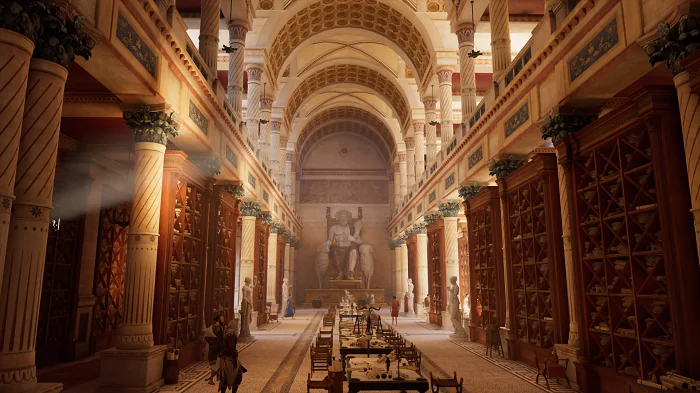
Verdict
Assassin’s Creed: Origins is a breath of fresh air for the franchise. It feels like the first step in the right direction. It badly needed it. Characters, music, good story – all of it is the heart of gaming, and I’m happy to see Ubisoft in top form. Assassin’s Creed: Origins is a good game. It may look a bit unoriginal at times, like you’ve already seen parts of it, but it still is a pleasant experience and one of the best games of the month, already filled with quality titles.
You’ll need more than 30 hours to get to the end, and after you’ll come back for more. This is a strong foundation for future success. I can see Assassin’s Creed getting better and more ambitious. Here’s hoping for more of the same.

